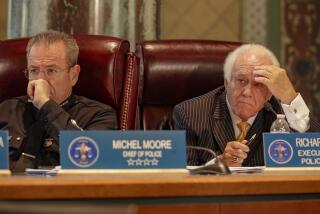Panel Puts Off Policy on Alarms
- Share via
The Los Angeles Police Commission told officers Tuesday they no longer need to respond to unverified burglar alarms, but suspended implementation of the controversial policy until July 15 to give officials more time to devise a compromise.
Sought by Mayor James K. Hahn, the delay provides more time for discussion of a counterproposal made by a majority of the City Council that would cut off police response only after three false alarms within one year.
The commission Tuesday modified its new alarm policy, approved in January, by requiring the broadcast of all burglar alarm calls, and giving officers the discretion to respond or not.
Police commissioners rebuffed a plea from four council members, led by Councilwoman Janice Hahn, for the “three strikes” policy. Councilwoman Wendy Greuel, another supporter of the three-strikes plan, said Tuesday that she will try to challenge the commission’s authority to make the final decision.
About 250,000 to 300,000 residents rely on alarms for protection in Los Angeles, according to the Police Commission. Last year, the LAPD responded to all alarms, totaling 121,973. Of those, 92% were false. The new policy would require physical verification of alarms, such as by a security guard, before police respond.
Police Chief William J. Bratton, commission President Rick Caruso and Mayor Hahn have argued that responding to unverified calls wastes police resources.
Appearing with council members Greuel, Dennis Zine and Cindy Miscikowski, Janice Hahn urged the commission to accept a plan proposed by a task force made up of commission and council staff, members of the public and representatives from the burglar alarm industry.
“You received a unanimous recommendation from the City Council of Los Angeles not only to review but to adopt the recommendations,” Janice Hahn warned the commission. “If you don’t adopt these recommendations, you’ll be ignoring not only members of the task force, but you’ll be ignoring the recommendation of the City Council and every resident of Los Angeles those council members represent.”
The mayor in the past has backed the commission’s alarm policy, with the caveat that neighborhood councils should have a say. Terry Martin, a policy analyst for the mayor, said the mayor wanted a delay to allow further discussion. Joe Gunn, former executive director of the commission, told members that even the council compromise created too much unnecessary work for officers.
“Under the plan they are proposing, [officers] are still going to respond to 61,000 calls that are false,” Gunn said. That is the equivalent of 8% of available patrol time “wasted,” he added.
Pulling no punches, Gunn also took aim at council members, including Bernard C. Parks and Janice Hahn, and accused the powerful alarm industry of fear-mongering.
“The alarm industry promised something to the consumers and what they promised them was the LAPD would be their runner,” said Gunn, who helped write the no-response policy. “The LAPD would do their job and respond to false alarms. That promise never came from the Police Department or Police Commission.”
The alarm debate follows a bitter dispute over whether the city can afford to hire hundreds of new police officers. Hahn and Bratton pushed for the new hires, but the council disagreed, saying that there wasn’t enough money. Without those officers, there is even more of an impetus to free up the current rank-and-file from having to respond to burglar alarms, Caruso argued Tuesday.
But the commission’s decision to stand by its original verified-response policy Tuesday seemed to maneuver the council out of any option to intervene.
The council, newly emboldened after its budget fight with the mayor, probably would have enough votes to overturn the commission’s decision. But the panel appeared to sidestep that possibility by amending its original policy to give officers the discretion to respond.
By not altering the essence of the original policy, the commission did not give the council an opportunity to overrule the panel, according to Police Commission staff members.
One compromise would be to allow property owners two false alarms a year before verification would be required for a police response. In exchange, the alarm industry would turn over its list of clients, which would allow the city to collect about $7 million annually in unpaid alarm permits, according to a source involved in the negotiations.
In a letter to commissioners, Hahn and Greuel also suggested allowing two false alarms or strikes per year, which they said would reduce police deployment to false alarms as much as 43%.
Alarm company owners remain optimistic that the commission will adopt something other than a verified alarm policy, said industry lobbyist Howard Sunkin.
“Three strikes is an alternative that works very effectively,” Sunkin said. Contrary to the commission staff, he maintained that Tuesday’s vote opened the door to a review of the issue by the council under the proposition governing the police panel’s powers and actions.
*
Times staff writer Andrew Blankstein contributed to this report.
More to Read
Sign up for Essential California
The most important California stories and recommendations in your inbox every morning.
You may occasionally receive promotional content from the Los Angeles Times.














